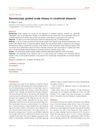Search
for
Sort by
Research
540-570 / 1000+ resultsresearch Female Pattern Hair Loss and Its Therapy
New treatments are improving options for female hair loss.
research A Clinical Study of 50 Cases of Female Pattern Hair Loss
Genetics, low estrogen, and low iron levels contribute to female hair loss, with specific scalp signs indicating severity.
research Relation Between Dermal Papilla Cells and Androgenetic Alopecia
Dermal papilla cells play a key role in hair loss by responding to androgens.

research Evidence-Based Guideline for the Treatment of Androgenetic Alopecia in Women and Men – Short Version
Use minoxidil for hair loss treatment; assess results after 6 months.

research Frontal Fibrosing Alopecia: A Survey in 16 Patients
The study found that Frontal Fibrosing Alopecia affects a broader age range of women and early treatment can help stop hair loss.

research Platelet-Rich Plasma in Dermatology: Boon or Bane?
Platelet-rich plasma might help with hair growth and skin conditions, but more research is needed to prove its effectiveness and safety.

research Treatment of Frontal Fibrosing Alopecia and Lichen Planopilaris: A Systematic Review
No effective treatment for frontal fibrosing alopecia was found, but oral 5-alpha-reductase inhibitors had the best response; for lichen planopilaris, topical corticosteroids were commonly used but had a high relapse rate.
research Efficacy And Safety Of A New Clobetasol Propionate 0.05% Foam In Alopecia Areata: A Randomized, Double-Blind Placebo-Controlled Trial
The new clobetasol propionate foam is effective and safe for treating alopecia areata.

research Acne-Associated Syndromes: Models for Better Understanding of Acne Pathogenesis
The document concludes that certain genetic mutations and dietary factors are involved in acne development, and treatments like isotretinoin and diet changes can help manage it.

research Sensitive Skin
Sensitive skin is often caused by nerve fibers and environmental factors, and can be managed with mild skincare and professional advice.

research Androgenetic Alopecia: An Update
Minoxidil and finasteride effectively treat hair loss.

research The Effect of CD34+ Cell-Containing Autologous Platelet-Rich Plasma Injection on Pattern Hair Loss: A Preliminary Study
Injecting CD34+ cell-containing platelet-rich plasma into the scalp can improve hair count and thickness in people with pattern hair loss.

research Clinical and Biological Impact of the Exposome on the Skin
Environmental factors, hormones, nutrition, and stress all significantly affect skin health and aging.

research Diffuse Hair Loss in an Adult Female: Approach to Diagnosis and Management
To manage hair loss in adult women, find the cause and treat it accordingly.

research Frontal Fibrosing Alopecia: Treatment with Oral Dutasteride and Topical Pimecrolimus
Oral dutasteride and topical pimecrolimus can safely and effectively treat Frontal Fibrosing Alopecia, leading to significant hair regrowth.

research Folliculitis Decalvans: A Multicenter Review of 82 Patients
Early onset and pustules indicate severe hair follicle inflammation, and while antibiotics help, the condition often worsens after treatment stops.

research 5 mg/Day Finasteride Treatment for Normoandrogenic Asian Women with Female Pattern Hair Loss
Finasteride improves hair density and thickness in women with hair loss.

research Hypertrichosis in Females Applying Minoxidil Topical Solution and in Normal Controls
Minoxidil use increases facial hair growth in females, more in older users.

research Dermoscopy-Guided Scalp Biopsy in Cicatricial Alopecia
Using dermoscopy to guide scalp biopsies is an effective way to diagnose cicatricial alopecia.
research Alopecia Areata as Another Immune-Mediated Disease Developed in Patients Treated with Tumor Necrosis Factor-Alpha Blocker Agents
Anti-TNF-α therapy may increase the risk of developing alopecia areata, especially in those with a history of autoimmune disease.

research Microneedling for the Treatment of Hair Loss
Microneedling can help stimulate hair growth, especially when used with other treatments, but it's not better than existing therapies.
research Comparing the Therapeutic Effects of Finasteride Gel and Tablet in Treatment of Androgenetic Alopecia
Finasteride gel is slightly more effective than the tablet for treating hair loss.

research Benefit and Risk Profile of Tofacitinib for the Treatment of Alopecia Areata: A Systematic Review and Meta-Analysis
Tofacitinib is somewhat effective for alopecia areata, but more research is needed on its safety and long-term effects.

research Efficacy of Non-Surgical Treatments for Androgenetic Alopecia: A Systematic Review and Network Meta-Analysis
Low level laser therapy works best for hair loss, followed by PRP, finasteride, and minoxidil.

research SARS-CoV-2-Induced Telogen Effluvium: A Multicentric Study
COVID-19 infection may cause significant hair loss, but full hair recovery is likely without special treatment.

research Efficacy of Tofacitinib in Treatment of Alopecia Universalis in Two Patients
Tofacitinib was effective in treating hair loss in two patients with alopecia universalis.

research Latanoprost in the Treatment of Eyelash Alopecia in Alopecia Areata Universalis
Latanoprost can effectively treat eyelash hair loss, with 45% of patients showing hair regrowth and no reported side effects.

research Anti-Androgens May Protect Against Severe COVID-19 Outcomes: Results From a Prospective Cohort Study of 77 Hospitalized Men
Anti-androgens, like finasteride, dutasteride, and spironolactone, may lessen the severity of COVID-19 in men, leading to fewer ICU admissions.
research Update on Detection, Morphology, and Fragility in Pili Annulati in Three Kindreds
Careful light microscopy is crucial for detecting mild cases of pili annulati, which weakens hair and varies widely in expression.